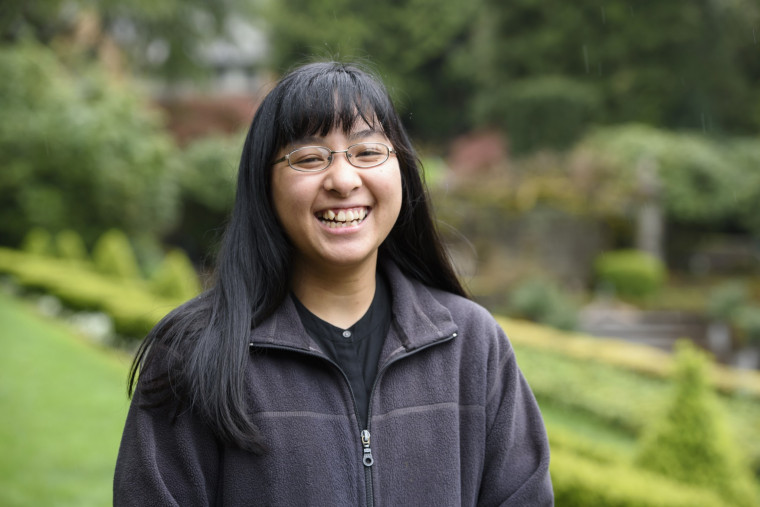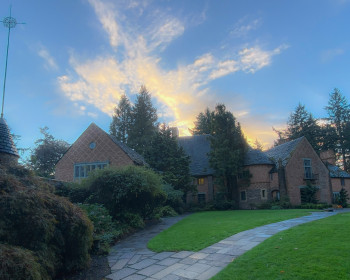Lani Felicitas
I find that whatever event is happening at L&C, critique and reflection is always welcome and there is always room for new ideas.

Pronouns
Degree and Class Year
Hometown
Major
Minor
Extracurriculars
What three words would you use to describe L&C?
Deep in possibility
What has been your favorite class so far? How did it expand your knowledge?
This past semester I took Social Theory, one of the requirements for the Sociology and Anthropology major, with Professor Sepideh Bajracharya, who is also my advisor. At first I was hesitant because I’ve never taken a class solely about theory, and I wasn’t sure if we were going to discuss theory’s relationship to praxis at all. We ended up beginning the course by reading bell hooks’ “Theory as Liberatory Practice,” and I enjoyed this class because of the way Sepideh put the academic canon in conversation with contemporary thought. To me, this is the heart of the liberal arts education. We read traditional theory not to simply take its word, but to further probe it, understand how and why a particular theorist gained influence, and see where possible contradictions lie.
I valued this class in that it taught me not to rely on or make assumptions about the canon or authors of particular backgrounds or identities. Being in this course, as well as a L&C student in general, taught me how to examine the details of their work in order to understand the author, as well as the larger conditions that make a particular work or theory possible.
We concluded the course by sharing reflections on the relationship between theory and praxis, and what we took away from the class. I’m grateful that I took this course as I started to get involved with Anakbayan Portland, a Filipino youth organization. It was in this space that I put theory into practice, and learned that the best theory is the collective analysis of the people, not just one’s own perspective. It is with theory that I understand the conditions of the world in all of its banalities and assumptions as a way to better the world and serve the people.
What made you want to come to Lewis & Clark?
I was born and raised in Hawai‘i and I’d never been to the continent before coming to L&C. I can’t remember why I was attracted to the Northwest, but I only applied to schools in Oregon and Washington. I had the opportunity to visit the college for a weekend through one of the fly-in trips, and I ended up having a great time. Portland is so vibrant, particularly the music scene and food culture, so that’s what made me even more excited about going to the continent for college. The campus had such a friendly atmosphere, and people were genuinely interested in who I was and what I wanted out of L&C.
What’s it like to be a symposium cochair? How did that experience complement your academic experience?
If in our classes we learn about the conditions of the world, then the Ray Warren Symposium on Race and Ethnic Studies offers the opportunity of both learning about the world and changing it. L&C sometimes feels sanitized because of its small campus vibe and the recurring archetype of a liberal arts student (myself included), but its “smallness” also gives liveliness and energy to the different symposia and student-organized events on campus. Some of these events or panels can range from 15 to 60 people in attendance. Often the smaller events are much more intimate, and the speaker gets to share more about themselves and the audience is more comfortable to share and build perspectives with one another. I find that whatever event is happening at L&C, critique and reflection is always welcome and there is always room for new ideas.
The cochair team wanted to prioritize the work of people of color, and we are so fortunate to be in a city that constantly has active people doing amazing work. To invite them to discuss their work on panels together in both thought-provoking and accessible language only adds to students’ journeys in the classrooms. Especially as a first-generation college student, I value my transformations inside the classroom, and how I carry those transformations when the semester is done. L&C may feel geographically isolated or intellectually sanitized sometimes, but it is these symposia and student-run events that remind me that new ideas are always possible. Opportunities like the Ray Warren Symposium gave me the ability to reach out to the people doing work in Portland and bridge that to an academic environment. This stretched my role as a student and reminded me to not only be critical of the world, but to share that critique, agitation, and excitement with my community in different ways besides writing a paper.
What’s your favorite thing about living in Portland?
I love how L&C provides the free shuttle from campus to downtown Portland because it creates opportunities to learn and get involved with different communities in the city and see what they are doing. I also love how the city has one of the best public transportation systems in the country. It just gives you more opportunities to bridge classroom to community, especially as a college student learning how to delegate time.
It definitely helps to have a friend who has a car, but some of my favorite spots in Portland are the following: the nickel arcade on SE Belmont, the Filipino-American Center on SE Stark for community events, and a small poke shop downtown called Braddah Bowls owned by some bros from Hawai‘i.
More Admissions Stories
Admissions is located in Frank Manor House on the Undergraduate Campus.
MSC: 32
email admissions@lclark.edu
voice 503-768-7040
fax 503-768-7055
Vice President of Admissions and Financial Aid
Eric Staab
Admissions
Lewis & Clark
615 S. Palatine Hill Road MSC 32
Portland OR 97219

